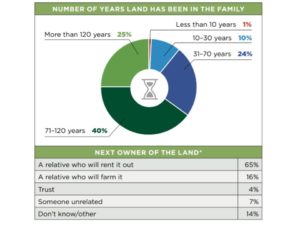NC Landowners Trust Farm Operators With Conservation Practices
go.ncsu.edu/readext?690639
en Español / em Português
El inglés es el idioma de control de esta página. En la medida en que haya algún conflicto entre la traducción al inglés y la traducción, el inglés prevalece.
Al hacer clic en el enlace de traducción se activa un servicio de traducción gratuito para convertir la página al español. Al igual que con cualquier traducción por Internet, la conversión no es sensible al contexto y puede que no traduzca el texto en su significado original. NC State Extension no garantiza la exactitud del texto traducido. Por favor, tenga en cuenta que algunas aplicaciones y/o servicios pueden no funcionar como se espera cuando se traducen.
Português
Inglês é o idioma de controle desta página. Na medida que haja algum conflito entre o texto original em Inglês e a tradução, o Inglês prevalece.
Ao clicar no link de tradução, um serviço gratuito de tradução será ativado para converter a página para o Português. Como em qualquer tradução pela internet, a conversão não é sensivel ao contexto e pode não ocorrer a tradução para o significado orginal. O serviço de Extensão da Carolina do Norte (NC State Extension) não garante a exatidão do texto traduzido. Por favor, observe que algumas funções ou serviços podem não funcionar como esperado após a tradução.
English
English is the controlling language of this page. To the extent there is any conflict between the English text and the translation, English controls.
Clicking on the translation link activates a free translation service to convert the page to Spanish. As with any Internet translation, the conversion is not context-sensitive and may not translate the text to its original meaning. NC State Extension does not guarantee the accuracy of the translated text. Please note that some applications and/or services may not function as expected when translated.
Collapse ▲ While you may have heard the term ‘absentee landowner’, it might be more appropriate to use the term ‘non-operating landowner (NOL)’ as highlighted by the title of this recent report by American Farmland Trust. In North Carolina, 337 male and female NOLs completed the survey and results are summarized in a four-page brief.
While you may have heard the term ‘absentee landowner’, it might be more appropriate to use the term ‘non-operating landowner (NOL)’ as highlighted by the title of this recent report by American Farmland Trust. In North Carolina, 337 male and female NOLs completed the survey and results are summarized in a four-page brief.
With an average age of 72, one-third of NOLs farmed in the past and 44% helped their parents farm. Almost two-thirds of NOLs did not live on the land they rent to others, but most lived less than an hour away with a median distance of 38 miles. Median acres owned by NOLs was 61, with 40 acres rented out for primarily crop production. Close to two-thirds stated that the next owner of the land will likely be a relative who will also rent it out.
This report indicated that two-thirds of the NOLs leased the cropland to a family member, a friend, or a neighbor, and have done so for median of 12 years through a verbal agreement. Furthermore, an overwhelming 90% of NOLs trusted their operator to make good conservation decisions. Similarly, NOLs prioritized keeping the land in farming, the needs of the farm operator, and soil quality as factors the NOL considered when making management decisions about their land.
For more information, the full report and the North Carolina results are available online. To arrange an online consultation with NC FarmLink staff, please complete this intake form.


